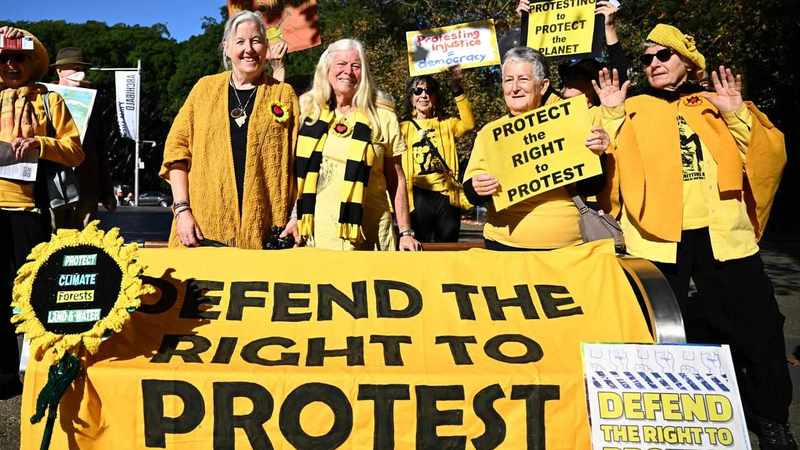A group of activist grandmothers has succeeded in invalidating parts of NSW legislation that criminalise protest activity near train stations and other public facilities.
Justice Michael Walton on Wednesday in the NSW Supreme Court declared invalid two subsections of the Crimes Act, which had criminalised conduct near a major facility that redirected people trying to use the facility or caused it to be closed.
The legislation was found by Justice Walton to be invalid because it unacceptably burdened the implied freedom of political communication found in the Australian constitution.
Helen Kvelde and fellow "knitting nanna" protester Dominique Jacobs had taken the NSW government to court after tough anti-protest laws were rushed through state parliament last year, coming into effect only 30 hours after being tabled.
The laws were introduced by the former NSW coalition government in April 2022 with the support of the then Labor opposition following a series of environmental protests that disrupted Sydney traffic.
"Environmental protests do constitute political communication," Justice Walton held, saying the legislation's provisions went beyond existing laws in restricting the implied freedom.
“We are happy the court has given some acknowledgement to the democratic right to protest," Ms Kvelde said following the decision.
"But these laws to me feel like a distraction; as if both Labor and the Liberal party are trying to get the population angry with protesters instead of angry against politicians for failing to protect us from climate emergency."
The Environmental Defenders Office representing Ms Kvelde and Ms Jacobs argued the laws impinged on political freedoms.
"The very purpose of these laws is to deter people from protest action and it is having that effect," their barrister Stephen Free said at the start of the court proceedings.
The NSW government had argued the implied freedoms in the constitution were “so slight as to be inconsequential", a view not accepted by the court.
The complainants had also asked the court to find amendments that altered the definition of “major bridge, tunnel or road” under the Roads Act 1993 beyond regulation-making power and therefore invalid. But they were unsuccessful.
The maximum penalty for offences under the legislation is two years' imprisonment or a $22,000 fine.
Under the legislation, conduct that causes damage to the major facility or seriously disrupts or obstructs people trying to use it remains illegal.
"I wish people would understand that ultimately these laws could affect anyone – anyone the government of the day does not like," Ms Kvelde said.
Greens MP Kobi Shetty, the NSW Greens democracy spokesperson, said the laws were a "knee-jerk" response and required proper community consultation regarding their impact on democratic freedoms in the state.
The Greens, unions such as the CFMEU and 230 civil and human rights groups opposed the laws' passing in 2022.









